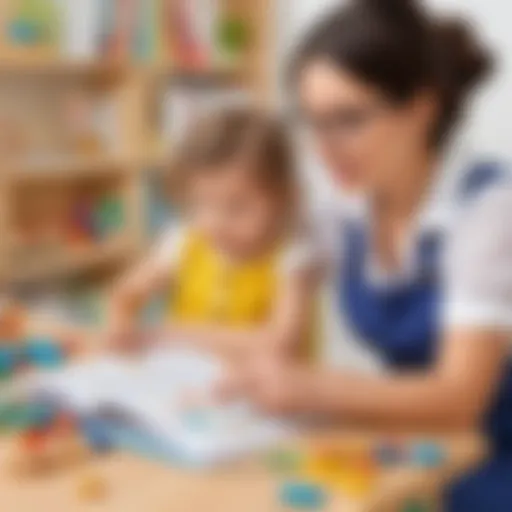Integrating Life Skills into Social Studies Education
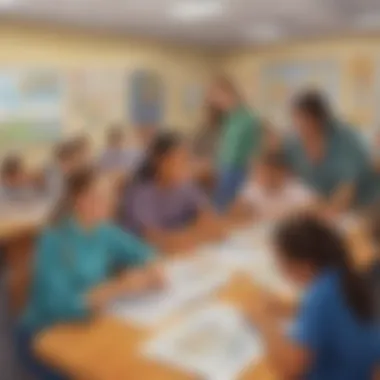

Intro
Integrating life skills into social studies is not just beneficial; it is essential. The modern educational environment demands more than teaching basic historical or geographical facts. Students today need to gain competencies that equip them for real-world challenges. Critical thinking, empathy, and problem-solving are a few of the vital abilities that can be nurtured through social studies education. This article examines effective ways to include these life skills, transforming how educators approach the subject.
Interactive Learning Games
Games can bridge the gap between academic learning and vital skills that children need. Engaging interactive games encourage students to think critically and collaborate effectively with peers.
Popular Games
- Captured - A strategy game that involves territory pressure. Players must work together to devise strategies, enhancing teamwork.
- Think-Ability Game - This game helps children develop strategic thinking. Players encounter challenges requiring problem-solving skills to advance.
- Empathy Builders - In this game, players make decisions that affect different characters' lives, emphasizing understanding and empathy.
Description of Top Educational Games
Some games encourage collaborative skills while teaching historical events. They invite education through experience. Others focus on developing empathy through role-playing situations relevant to social studies. Educational games prove to be pivotal in shaping how children learn and retain new information.
Benefits of Playing Educational Games for Kids' Cognitive Development
Learning games can inspire curiosity among students. They can stimulate cognitive skills by challenging their reasoning, decision-making, and critical thinking. Games pose various scenarios where children must adapt and solve conflicts. In doing so, they gain the ability to think independently while also cooperating with others.
Game Reviews
Games add a dynamic layer to traditional learning methods. By integrating engaging material, educators capture student interest more successfully.
In-Depth Reviews of Selected Educational Games
Each game possesses unique attributes that help foster different skills. Educators should assess games based on their effectiveness and usefulness in teaching key life skills in social studies classrooms.
Comparison of Gameplay and Learning Outcomes
Collecting feedback from students who engaged with these games emphasizes observable learning improvements. Analyzing both quantitative results concerning students' literacy and qualitative feedback regarding their enjoyment can showcase the multifaceted outcomes of using games in education.
Tips and Tricks
Modern education also involves providing valuable insights for parents and educators. Here are strategies to improve children's learning experiences:
- Create a Dedicated Learning Space: This encourages focus and organization while learning.
- Incorporate Real-World Scenarios: Discuss societal issues and engage students in debates.
- Foster Open Communication: Encourage children to express what they learn, enhancing retention.
Making learning relatable and engaging benefits students significantly. Teaching life skills adds worth to academic learning, preparing children for the complexities that lie ahead.
Creative DIY Projects
Engaging hands-on projects enable students to utilize their creativity and foster a sense of accomplishment. Simple yet impactful activities can make a profound difference.
Step-by-Step Guides
- Creating Historical Diaries: Have students choose an era, research facts, and create a personalized diary.
- Building Cultural Masks: Students can learn about various cultures while crafting their own masks, encouraging respect for different traditions.
Craft Ideas
Using easily accessible materials can inspire creativity. Cards, paper, and recycled items become tools to express historical and cultural knowledge. Encouraging consideration of art forms helps solidify the lessons taught in social studies, emphasizing the importance of cultural appreciation in development.
Interested readers can find additional materials on Britannica and community discussions on Reddit.
Bringing real-life skills into the educational framework will create better-informed and more engaged students.
The Role of Social Studies in Education
Understanding Social Studies
Social studies serves as a bridge connecting various disciplines and offering students critical understanding of their world. It includes concepts from history, geography, economics, and sociology, fostering intellectual curiosity and societal awareness. Students learn about historical events, cultural influences, and governmental structures. This exploratiion helps young people develop a more nuanced view of their society and its complexities.
Social studies encourages students to think analytically and engage with diverse perspectives. As they explore different cultures and societies, it broadens their worldview. This subject is not just about memorizing facts; it is about developing the capacity to consult various sources of knowledge. This function aids in the cultivation of valuable skills pertinent to decision-making and citizenship.
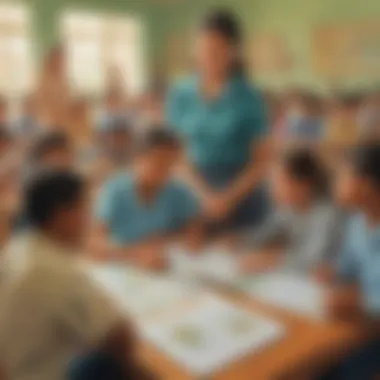

Importance of Social Studies in Curriculum
The significance of social studies in the curriculum cannot be overlooked. It is essential to the collective understanding necessary for responsible citizenship. A strong foundation in social studies equips students with the tools to engage meaningfully in discussions regarding social issues. They learn about rights, responsibilities and the importance of participating in their communities, now and in the future.
There are several key reasons for its inclusion in the educational framework:
- Civic Education: Social studies prepares students to be informed citizens who can engage thoughtfully in civic duty.
- Cultural Awareness: Studying diverse cultures nurtures empathy and respect among peers.
- Critical Thinking: It offers opportunities for analyzing complex situations, evaluating evidence, and articulating arguments.
Without this foundation, students risk becoming narrowly defined individuals, unable to comprehend the multifaceted issues facing society today.
Social Studies and Lifelong Learning
Lifelong learning is vital in today’s rapidly changing world. Social studies instills the ability to adapt, reflect, and expand understanding throughout one’s life. The skills developed through social studies offer pathways to analyze ongoing changes within society. Importantly, it encourages a habit of questioning and engaging with the world.
Effective social studies education aims to cultivate inquiry and critical analysis. It helps in the development of skills that benefit the learners well beyond immediate schooling. Some aspects linked to lifelong learning through social studies include:
- Continuous Problem Solving: Lifelong learners face challenges vigorously and draw upon knowledge to resolve them.
- Adaptability: Understanding societal changes enables a flexible mindset essential for growth.
- Collaborative Skills: Social studies often require group discussions, enhancing skills to work collaboratively.
Integrating these aspects assures that students not only retain knowledge from their social studies education but can effectively utilize their insights as active participants in their communities.
Defining Life Skills
Defining life skills is critical in understanding how they connect to students' success in social studies education. Life skills go beyond basic academic competencies, equipping learners with the tools necessary to navigate complex life situations. The integration of these skills into social studies presents an opportunity to deepen students’ understanding of themselves and their societies, fostering both personal evolution and civic responsibility.
What Are Life Skills?
Life skills refer to a range of abilities that enable individuals to deal effectively with demands and challenges of everyday life. These competencies encompass various domains, from decision-making and problem-solving to interpersonal communication. Understanding and defining these skills is foundational in establishing a curriculum that not only prepares students for tests but also for life.
Categories of Life Skills
Integrating life skills requires clarity about the types of essential competencies that can be developed. These categories provide a framework:
Personal Skills
Personal skills are essential for personal development and self-management. This includes time management, decision-making, and goal-setting. One key characteristic of personal skills is their focus on individual capabilities. They give students a sense of ownership, making them beneficial for developing independence and self-identity. However, without guidance in application, these skills can sometimes be under-utilized.
Interpersonal Skills
Interpersonal skills focus on how individuals interact and communicate with others. These include conflict resolution, teamwork, and empathy. These skills are crucial as they contribute to building a cooperative environment. A defining feature of interpersonal skills is their collaborative nature, which can be crucial in social studies class engagement. They may sometimes be overlooked in curriculum design, limiting students' abilities to work effectively in teams.
Cognitive Skills
Cognitive skills refer to mental capabilities that facilitate understanding and processing information, such as critical thinking and analysis. This category is beneficial to students by enabling them to interpret information critically and understand different viewpoints. The unique feature lies in their application to real-world scenarios, but they may require structured practice within projects or discussions in the classroom.
Emotional Skills
Emotional skills involve recognizing and managing one's own emotions and those of others. This includes self-regulation, emotional awareness, and empathy. These skills can significantly enhance students’ social interactions and promote a supportive learning environment. Emotional skills help students develop resilience and adaptability, yet they may pose a challenge if the classroom is not a safe space for emotional expression.
Life Skills for Different Age Groups
Recognizing that life skills evolve with age is vital. Young children might focus on basic emotional understanding and decision-making, while adolescents delve into a broader understanding of interpersonal and cognitive skills. This difference allows educators to tailor their approaches to suit varying developmental stages, optimizing learning experiences and outcomes.
Integrating Life Skills into Social Studies
A well-planned integration brings several benefits. It encourages critical thinking, helping students make sense of their surroundings and articulate their viewpoints credibly. Empathy is cultivated through discussions that appreciate varied perspectives. Moreover, problem-solving abilities grow as students tackle real-life issues embedded in their curricula. With these essential skills, social studies become more than a subject; they evolve into a crucial aspect of personal growth and development.
In this section, we will explore a variety of teaching strategies that facilitate this integration, delving into experiential learning, collaborative projects, and reflective practices.
Teaching Strategies for Integration
Experiential Learning
Experiential learning provides a strong foundation for integrating life skills into social studies. This strategy emphasizes learning through experience and reflection. It enhances the students' ability to connect theoretical knowledge with real-world applications. A key characteristic of experiential learning is its active engagement, placing students in situations where they can explore concepts hands-on. This makes it particularly beneficial for developing problem-solving skills.
A unique feature of experiential learning is its adaptability. Teachers can align the learning activities with the social studies topics they cover, whether that’s through simulations, field trips, or community service projects. One advantage is the memorable nature of such learning. Students often retain information gained through experiences much longer than in traditional settings. However, educators may need to manage resources and time effectively to implement these strategies well.
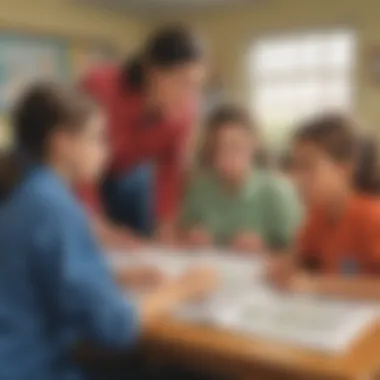

Collaborative Projects
Collaborative projects bring students together to work on tasks, fostering interpersonal and communication skills. The social aspect of such work encourages students to negotiate, share, and value each other's contributions. This aspect is vital for developing empathy, as they learn to appreciate diverse perspectives and cooperate.
The key characteristic of collaborative projects is their inherent reliance on teamwork. They promote skills that are crucial not only in academics but also in future career settings. A unique facet of this method is the ability to create real impact. Projects can address real community issues, allowing students to apply their learning while contributing positively.
However, managing group dynamics may sometimes pose challenges. Ensuring fair participation among all students requires careful facilitation from educators.
Reflective Practices
Reflective practices encourage students to think critically about their experiences and learning processes. This strategy cultivates metacognitive abilities—enabling students to understand their thinking and decision-making processes. A key characteristic is the ongoing nature of reflection, which may occur through journals, discussions, or peer reviews.
Its unique feature lies in boosting self-awareness. By assessing their actions and understanding their motivations, students grow more confident in their abilities to navigate complex situations. Reflective practices are beneficial, but they may not yield immediate results. It requires time and patience for students to develop this kind of awareness and commitment, making consistent application crucial.
Curriculum Design and Life Skills
Effective curriculum design should naturally incorporate opportunities for developing life skills. Schools can weave skills such as communication and responsibility throughout all lessons instead of treating them as separate units. This approach ensures that life skills become a fundamental part of the learning journey. Each social studies topic can serve as a platform to cultivate these essential skills.
A well-structured curriculum integrates life skills at every level. Subject matter might cover critical historical events, but framing discussions that build problem-solving scenarios or allow students to express thoughts promotes understanding profoundly. The balance between academic knowledge and life skills creates depth in the educational experience, addressing various learning styles.
Utilizing Real-World Contexts
Bringing real-world contexts into social studies education makes learning relevant. This method connects academic content with students' lives, reinforcing the significance of what they learn. Utilizing local issues, current events, or historical connotations that resonate with the community enriches the educational experience.
Employing local complexities allows children to practice their life skills meaningfully. Students work through relatable concepts while empathizing with community challenges. This relevance cultivates a deeper understanding, enhancing analytical and critical faculties.
Assessing Life Skills in Students
Assessing life skills in students is a critical aspect of integrating these competencies within social studies. It serves not only to evaluate students' learning but also to enhance their understanding of real-world applications. Life skills assessments help identify areas where students excel or need improvement. Tools such as assessments can show if students are acquiring key abilities like problem-solving, critical thinking, and emotional intelligence.
Methods of Assessment
Formative Assessment
Formative assessment involves monitoring student performance during the learning process. This strategy comes with ongoing feedback, making it a dynamic part of teaching life skills. The key characteristic of formative assessments is their ability to inform instruction. Educators can make adjustments in their teaching based on students' needs. This is a beneficial choice for strengthening frameworks in social studies as it aligns education with students' evolving understanding.
Unique features of formative assessment include informal observations, quizzes, and group discussions. These allow for continued observation of skills over time, offering distinct advantages in gathering information. However, some may encounter challenges with motivation from students in non-traditional formats.
Summative Assessment
Summative assessment evaluates student learning at the end of an instructional unit. It typically involves more formal testing or projects. A key characteristic of summative assessments is their ability to provide a comprehensive view of what students have learned. They are common choices in educational settings, providing benchmarks that can guide improvement.
Unique aspects of summative assessments may incorporate portfolios showcasing students work. These inputs show not only end results but also allow for reflection on development. Such advantages can also carry downsides. Some students may perform under pressure but understand the content less intuitively.
Peer Feedback
Peer feedback opens an opportunity for students to assess each other’s work. This approach is constructive because it encourages collaboration and imparts new perspectives. A main benefit is how this fosters communication skills, crucial for both personal and academic performance. Collaborating and getting feedback trains students to evaluate and improve their own work and that of their peers.
In context of life skills, immediacy of peer feedback makes it dynamic. The downside can arise with inconsistencies in the depth of feedback each student provides, based on their own understanding of the material.
Setting Learning Objectives
Learning objectives should be clear and measurable. By focusing on what skills need to be addressed, teaching becomes more targeted and effective. Objectives could range from understanding a multicultural perspective, solving societal problems, to developing empathy. It aligns teaching strategies to the needs of the students.
Tracking Progress and Impact
To track progress and instructional impact, consistent evaluation of both individual and group performances is required. Data can come from various assessments, parent feedback, or self-reflection after project completions. Educators ought to be clear about expected outcomes to measure success.
Once addressed through these methods, life skills become woven into daily curriculum, resonating in unexpected, yet rewarding ways across the students’ lives.
Challenges in Teaching Life Skills through Social Studies
Integrating life skills into social studies is essential yet presents several challenges that educators need to navigate. This topic helps to highlight barriers, resistance, and the diverse needs that can surface when trying to make this education approach effective. Identifying and addressing these challenges is crucial for promoting not only effective learning but also meaningful application of life skills in real scenarios.
Identifying Barriers in Education
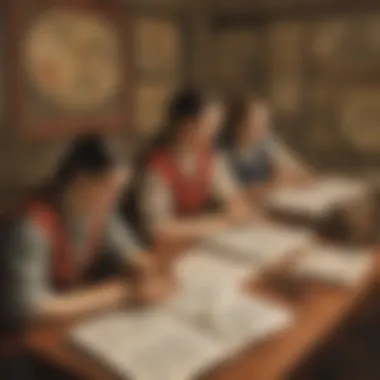

Various barriers can hinder the successful integration of life skills. First, the existing curriculum often prioritizes factual knowledge over critical thinking and personal development. Many teachers might feel pressed by academic standards and assessments that focus primarily on content retention. This creates a gap where applied skills or life skills may receive less emphasis. Additionally, a lack of training in teaching life skills can leave educators unsure of the best practices to incorporate these into their lessons. It can also be difficult to measure progress in areas that are subjective, like emotional understanding and interpersonal skills, leading to uncertainty in how to gauge success in such initiatives.
The necessity for educators to initate dialogue and share strategies to address these barriers cannot be underestimated.
Overcoming Resistance to Change
Resistance to integrating life skills curriculum can come from multiple fronts. Some educators may feel skeptical about shifting their teaching focus from traditional methods. They may see these shifts as unnecessary or that it adds to their workload. Others include administrators who may fear that introducing life skills takes away from students' academic performance diligence. To overcome this resistance, providing clear proof of the impact of life skills education is crucial. Highlighting success stories from various districts or schools can serve as motivation as will including continuous professional development programs designed to equip teachers with necessary skills and confidence. Fostering a shared vision among stakeholders can go a long way.
Addressing Diverse Learning Needs
Every classroom is made up of students with diverse backgrounds. Differentiating instructions can be challenging amid the complexity of teaching life skills within social studies. Recognizing that students have varied learning styles and needs is essential. This means employing a range of approaches and materials that engage visual, auditory, and kinesthetic learners. For instance, group discussions, role-playing activities, and project-based learning can accommodate various learners. Moreover, conducting assessments to determine each student's proficiency in specific life skills can aid educators in tailoring their strategies effectively. Creating inclusive environments and actively listening to student feedback allows for more targeted interventions and responsiveness to their needs.
Ultimately, by addressing these challenges head-on, schools can shape a generation better equipped with the life skills that transcend classroom lessons.
The Role of Parents and Community
Parents and community members play a crucial part in the integration of life skills within social studies education. Their engagement fosters a supportive learning environment, extends the learning process beyond the classroom, and contributes to the development of critical and empathetic citizens. Involving them not only enhances the educational experience, but also empowers students to apply their skills in real-life situations.
Engaging Parents in the Learning Process
To boost student learning, it is important for parents to be actively engaged in their children’s education. Communicating regularly with parents about the curriculum united with life skills teachings is vital. Schools can host workshops that give parents knowledge on how talk about social studies topics at home and reiterate the importance of skills like problem-solving and empathy.
Educators can invite parents to participate in classroom activities or discussions. Such engagements open platforms for parents to share their own experiences which can enrich the students. This can be done through:
- Volunteering in the Classroom: Parents can assist teachers in delivering lessons or organizing events.
- Attending School Events: Community events can connect parents to educational activities, resulting in more involvement.
- Joining Parent-Teacher Associations: Engaging in these groups can help expand the community's role in shaping curricular decisions.
When parents understand the relevance of life skills in social studies, they are more likely to reinforce and model these skills at home.
Building Community Partnerships
Building ties with local organizations adds depth to social studies programs. Community partnerships bring cultural and historical perspectives into the student’s learning experiences. Local museums, cultural centers, or history clubs are pertinent resources that can enrich the curriculum and connect academic content to the local society.
Here are several strategies to consider:
- Resource Sharing: Collaborating data or experiences can provide authentic learning opportunities for students.
- Field Trips and Guest Speakers: Local experts can be invited to speak or provide hands-on experiences that bring social studies to life.
- Service Projects: Involving students in community service can deepen their understanding of civic responsibility and foster positive social skills openly in the community.
Such connections offer students peer and adult role models, increasing the supportive network around them.
Encouraging Lifelong Learning Beyond the Classroom
Lifelong learning does not simply stop at the classroom door. Parents and the community can access tools that promote continued learning experiences for children. These are critical as they broaden knowledge and instill values that modern education pursuits
Future of Social Studies and Life Skills Education
The future of social studies and life skills education is a crucial topic for today's educators and parents. Understanding this intersection helps to provide a clear pathway for integrating essential competencies into the curriculum. This integration ensures that students not only gain knowledge about history, geography, and culture, but also practical skills applicable to personal and social challenges.
The evolving nature of education requires a responsive approach. Here, emerging trends, the impact of technology, and a vision for educational reform play pivotal roles. Together, these factors can shape a generation of critically thinking, empathetic, and resourceful individuals.
Emerging Trends in Education
Trends in education highlight a shift towards a more holistic approach. This approach focuses on student readiness for real-world situations, preparing them for it in ways that traditional education may not. Here are some trends worth noting:
- Interdisciplinary Learning: There is a growing emphasis on connecting different subject areas, such as combining social studies with STEM education.
- Social Emotional Learning (SEL): With an increase in awareness around mental health, schools prioritize SEL to ensure kids develop lifetime skills such as empathy, self-regulation, and problem-solving.
- Project-Based Learning (PBL): PBL enhances critical thinking by engaging students in meaningful projects that tackle real-life issues, which aligns perfectly with social studies themes.
By focusing on these trends, educators can tailor their teachings, allowing students to flourish not only academically but also socially and emotionally.
The Impact of Technology
Technology wields a profound impact on modern education. It acts as a powerful tool. Integration technology allows for new ways of enhancing life skills education within social studies. Here are some points on this impact:
- Accessibility of Information: Tools such as online databases and e-books provide readily available information, encouraging critical analysis of data.
- Collaborative Platforms: Platforms like Google Classroom or Microsoft Teams support project-based learning and peer interaction, focusing on communication skills.
- Virtual Simulations: Immersive educational software allows students to explore historical events and social issues, bridging theoretical knowledge with practical applications.
These technological innovations not only enhance learning experiences but also shape life skills development, preparing students for the future workplace.
Vision for Educational Reform
Educational reform is necessary to navigate the complexities of contemporary education. Social studies must evolve, ensuring life skills are not seen as ancillary but integral. Key considerations for future reform include:
- Curriculum Modernization: Updating curricula to serve the needs of today’s global society fosters a critical understanding of the world. \
- Teacher Training: Educators must be equipped with the knowledge and tools to incorporate life skills seamlessly across their teachings.
- Community Engagement: Strengthening the connection between schools and communities empowers students to apply their learning in real-life settings.
Reforming social studies education can ignite a transformation in how life skills are taught and perceived, moving educators towards a more impactful teaching model.



